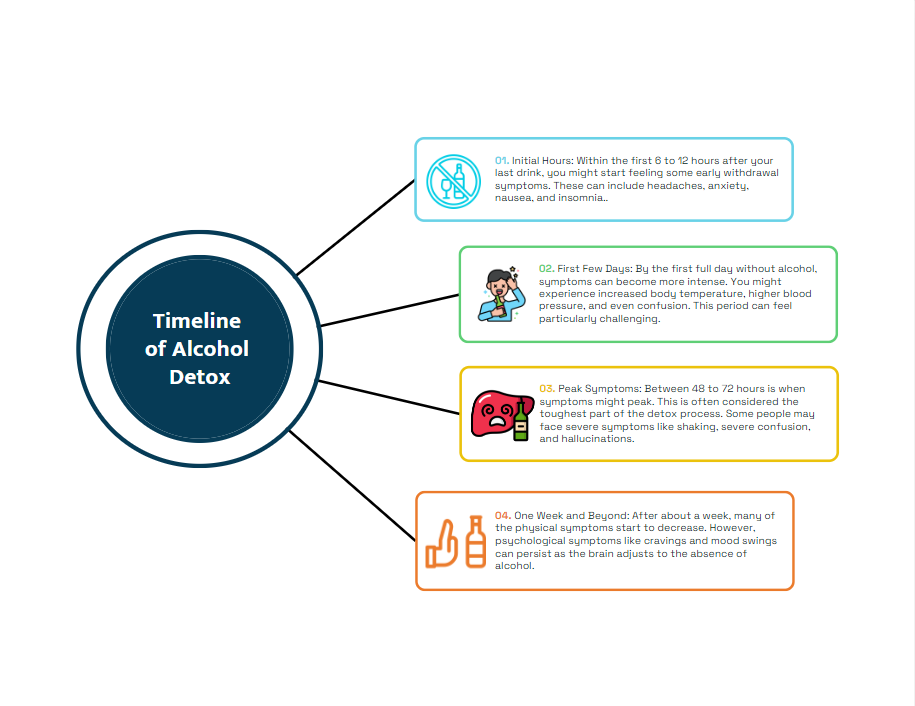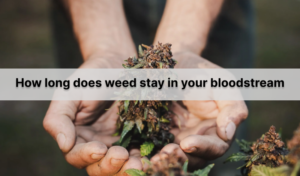Alcohol withdrawal refers to a group of symptoms that may occur when a person who has been drinking heavily for weeks, months, or years stops or significantly reduces their alcohol consumption. These symptoms can range from mild anxiety and shakiness to severe complications, such as seizures and delirium tremens (DTs).
Alcohol withdrawal happens because the brain adapts to the alcohol’s presence over time, and when the alcohol is suddenly removed, the body needs time to adjust to its absence.
Detox from alcohol, or alcohol detox, is the process of removing all alcohol from the body and managing withdrawal symptoms in a safe and controlled environment. This process is typically the first step in treating alcohol dependence or addiction.
Alcohol detox aims to help individuals through the withdrawal phase with as little discomfort as possible, often under medical supervision. Medical professionals may use medications to treat severe withdrawal symptoms and monitor the individual’s health to prevent complications. Detox from alcohol is crucial because it cleanses the body and paves the way for further treatment and recovery efforts.
How Long Does It Take to Detox from Alcohol
If you or someone you know is thinking about stopping alcohol use, understanding the process of alcohol detox is crucial. Detox from alcohol can vary greatly from person to person, but it’s important to know what to expect.
Timeline of Alcohol Detox
The duration of detox from alcohol can differ based on several factors like how much and how often you drink, your overall health, and whether you have undergone detox before. Generally, detox can last from a few days to over a week.

- Initial Hours: Within the first 6 to 12 hours after your last drink, you might start feeling some early withdrawal symptoms. These can include headaches, anxiety, nausea, and insomnia.
- First Few Days: By the first full day without alcohol, symptoms can become more intense. You might experience increased body temperature, higher blood pressure, and even confusion. This period can feel particularly challenging.
- Peak Symptoms: Between 48 to 72 hours is when symptoms might peak. This is often considered the toughest part of the detox process. Some people may face severe symptoms like shaking, severe confusion, and hallucinations.
- One Week and Beyond: After about a week, many of the physical symptoms start to decrease. However, psychological symptoms like cravings and mood swings can persist as the brain adjusts to the absence of alcohol.
How to detox from alcohol
Detoxing from alcohol is a critical step for those looking to overcome dependence on alcohol. It’s important to approach this process with care, ensuring it’s both safe and effective. Below, we’ll explore three key points about how to detox from alcohol using straightforward, accessible language.
1. Consult with Healthcare Professionals
Before you start an alcohol detox, it’s essential to speak with a healthcare professional. Detoxing from alcohol can sometimes lead to severe withdrawal symptoms that require medical supervision.
A doctor can guide you on the safest way to detox based on your health history and current condition. They might also provide medications to help manage withdrawal symptoms safely, ensuring you remain as comfortable as possible during the detox process.
2. Create a Supportive Environment
Detox from alcohol can be both physically and emotionally challenging. To make this process smoother, surround yourself with supportive friends or family who understand what you’re going through. Additionally, consider joining support groups where you can connect with others in similar situations.
These groups can offer encouragement, share experiences, and provide practical advice during your detox journey. Ensuring you have a strong support network can make a significant difference in your ability to stick with your detox plan.
3. Gradual Reduction of Alcohol Intake
Instead of stopping abruptly, which can shock your system, a gradual reduction in alcohol consumption is often recommended. This method can help minimize withdrawal symptoms and make the detox process more manageable. Your healthcare provider can help you develop a personalized tapering schedule, which will allow your body to adjust slowly to lower levels of alcohol.
Alcohol detox at Home
Thinking about detoxing from alcohol at home? It’s a big step toward recovery. To do it safely, it’s crucial to start by reducing your drinking slowly. This helps lessen withdrawal symptoms. Always talk to a healthcare professional before you start. They can offer guidance based on your specific needs.
Not everyone should detox at home. If you have a severe addiction or have been dependent for a long time, a professional medical detox is safer. These programs provide medical oversight to help manage severe withdrawal symptoms.
If you choose to detox at home, prepare your space. Remove all alcohol. Arrange for someone supportive to be around. They can help you and get medical help if needed. Keep hydrated, eat well, and stay engaged with light activities like reading or gentle walks.
Watch for withdrawal symptoms. These can range from mild anxiety to severe issues like seizures. If severe symptoms appear, get medical help right away.
Detoxing at home needs careful planning and support. Always put your health first. Talk to a professional and ensure you have the right support in place.
The Risks of At-Home Alcohol Detox and Withdrawal
- Health Complications: Alcohol detox can lead to severe health issues when attempted at home. Symptoms like seizures, hallucinations, and heart problems are common risks associated with sudden withdrawal from alcohol. These conditions require immediate medical attention, making at-home detox dangerous without professional supervision.
- Unmanaged Withdrawal Symptoms: Detox from alcohol can produce uncomfortable and often painful withdrawal symptoms such as shaking, sweating, nausea, and extreme anxiety. In a non-clinical setting, these symptoms can become overwhelming, increasing the risk of relapse as individuals may consume alcohol to alleviate the discomfort.
- Lack of Medical Support: Professional medical environments offer critical support and medications to manage withdrawal symptoms safely. At home, individuals lack access to these resources, potentially leading to unmonitored complications. Medical professionals can also provide psychological support and guidance, which are crucial during the initial stages of detox from alcohol.
When does alcohol withdrawal start
Are you thinking about stopping alcohol? It’s important to know when withdrawal might start. Usually, symptoms begin 6 to 24 hours after your last drink. But this can vary based on how much and how often you drink.
It’s best to detox from alcohol with a doctor’s help. This is because withdrawal can be tough. You might feel shaky, confused, or even have seizures. These are serious symptoms that need medical care.
Looking for help? Choose a program that has medical support. They know how to ease withdrawal symptoms and make you more comfortable. Starting an alcohol detox is a big step towards health. Picking the right help can really make a difference
Stages of Alcohol withdrawal
Undergoing a detox from alcohol involves several stages, each with its own set of symptoms and challenges. Understanding these stages is crucial for anyone considering an alcohol detox, as it prepares you for the journey ahead and informs the support you might need.
Stage 1: Early Withdrawal
The first stage begins within hours of your last drink. You may experience anxiety, insomnia, nausea, and abdominal pain. This is your body starting to adjust to the absence of alcohol. It’s a tough stage, but crucial for the detox process.
Stage 2: Peak Withdrawal
Typically occurring within the first 24 to 72 hours, this stage is the most intense. Symptoms can include increased heart rate, elevated blood pressure, and potentially severe tremors. In some cases, there can be confusion and hallucinations. Close monitoring is essential during this phase.
Stage 3: Subacute Withdrawal
Extending over weeks, this stage sees a gradual decline in the intensity of physical symptoms. Psychological symptoms like mood swings, low energy, and disrupted sleep patterns can persist. Support and coping strategies are vital here to maintain progress.
Stage 4: Protracted Withdrawal
Some individuals might experience ongoing symptoms that include emotional discomfort and cravings. This stage can last for months but is manageable with the right lifestyle changes and continued support from professionals and peer groups.
Symptoms of alcohol detox
When someone stops or reduces heavy alcohol use, they might experience alcohol detox symptoms. This process can be challenging and varies from person to person. Here are some common symptoms individuals may encounter during detox from alcohol:
- Anxiety
- Sleep Disturbances
- Nausea and Vomiting
- Tremors
- Sweating
- Headaches
- Mood Swings
- Increased Heart Rate
- Hallucinations
- Seizures
H2: Top 6 Foods to Support Your Journey to Alcohol Detox
It is essential to support your body with the right nutrients. Incorporating certain foods into your diet can help speed up the process of eliminating alcohol toxins and restoring your body’s balance. Here are six foods that are beneficial for alcohol detox and how each can contribute to your recovery.
1. Leafy Greens
Leafy greens such as spinach, kale, and Swiss chard are packed with essential vitamins, minerals, and fiber. These nutrients support liver function, which is crucial during alcohol detox. The high levels of antioxidants found in leafy greens also help combat oxidative stress caused by alcohol consumption.
2. Whole Grains
Whole grains like oats, brown rice, and quinoa are great for maintaining steady blood sugar levels. When detoxing from alcohol, stable blood sugar can help reduce cravings and mood swings. Additionally, whole grains are rich in B vitamins, which play a vital role in the metabolism of alcohol and the restoration of body functions affected by alcohol use.
3. Lean Proteins
Lean proteins, including chicken, turkey, and fish, provide the amino acids necessary for repairing tissues and building neurotransmitters, which are often depleted by excessive alcohol use. Protein-rich foods also help keep you fuller longer, aiding in overall recovery and wellness.
4. Fruits High in Vitamin C
Citrus fruits, strawberries, and kiwi are high in vitamin C, which is important for detoxifying the body from alcohol. Vitamin C helps bolster the immune system and assists the liver in flushing out toxins. Moreover, the natural sugars in fruits help satisfy the sweet cravings that often accompany alcohol withdrawal.
5. Nuts and Seeds
Nuts and seeds are excellent sources of healthy fats and minerals, such as magnesium, which aids in relaxation and sleep—both critical factors during the detox process. Foods like almonds, flaxseeds, and walnuts also provide vitamin E, which helps protect the liver from further damage.
6. Yogurt and Other Probiotics
Consuming yogurt and other probiotic-rich foods like kefir and sauerkraut can improve gut health, which is often compromised during periods of heavy drinking. Probiotics help restore balance to the gut flora, leading to improved digestion and absorption of nutrients, crucial for recovery during alcohol detox.
Let’s recap
Alcohol detox is crucial for safely managing withdrawal symptoms after heavy drinking. It starts within hours of the last drink and can extend over a week. Symptoms peak between 48 to 72 hours. Medical supervision is recommended to safely manage severe symptoms like seizures. Supportive environments and gradual alcohol reduction ease the process. Home detox has risks and requires careful planning and professional advice. Nutritious foods like leafy greens and fruits high in vitamin C aid recovery. Always consult a healthcare professional before starting detox.







